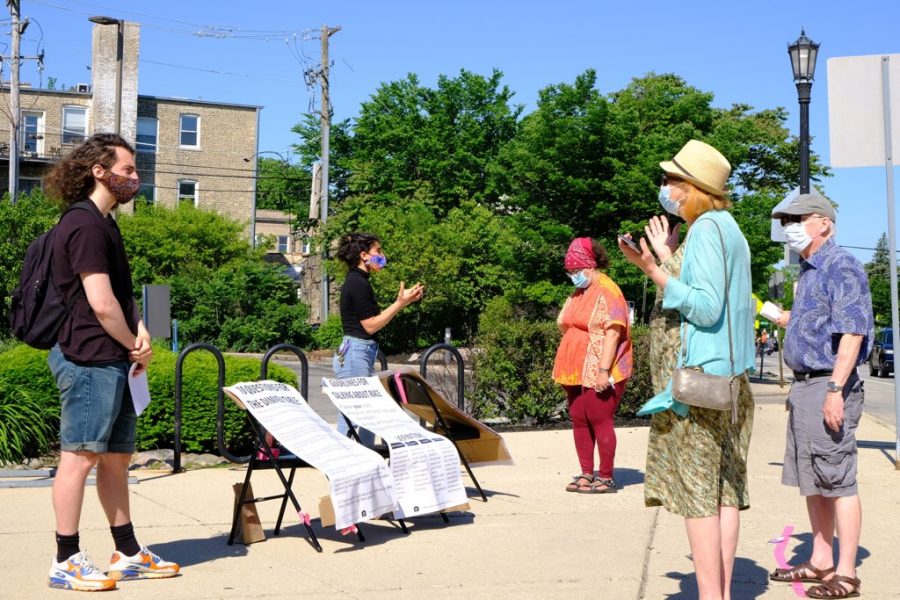ETHS students and grads talk whiteness and anti-racism on Central Street
Youth participants in “Talking Whiteness on Central Street” discuss systemic racism with North Evanston residents. Evanston’s northernmost census tracts range from 85 to 93 percent white, according to data from the 2018 American Community Survey.
June 7, 2020
As residents of Chicago’s South and West sides participate in “community cleanups” after protests against police brutality, Evanston resident Lydia Collins wondered what a community cleanup would look like in her predominantly white North Evanston neighborhood.
Evanston’s northernmost Census tracts range up to around 93 percent white, according to data from the 2018 American Community Survey. In this community, Collins said, conversations that challenge white supremacy are often “taboo.”
Collins, along with 30 Evanston Township High School students and graduates, organized the event “Talking Whiteness on Central Street” on Saturday to spark a community cleanup of the city’s historic white supremacy.
At stands with posters across multiple Central Street blocks, youth participants called on their neighbors to discuss how white North Evanston residents are complicit in systemic racism. The team provided anti-racist education resources and directed residents to take action for racial justice by engaging with local organizations like YWCA Evanston/North Shore, Evanston Aid and the Black Business Consortium of Evanston/North Shore.
Organizer Blaire Frett said most of her conversations centered on segregation in North Evanston, as well as Evanston’s history of redlining and its new reparations fund.
The city in the mid-1900s zoned most blocks holding black residents for commercial use — except a region that would become Evanston’s 5th Ward — and demolished dozens of the black-occupied houses. Now, according to 2010 census data, 41.5 percent of 5th Ward residents identify as black. That same ward holds the lowest property values in the city, according to city documents.
“My conversations were getting people to think about the implications of where they’re living, and why they’re living here,” Frett said. “And ways to use our wealth, and redistribute it to the places that Evanston has historically not invested in.”
The vast majority of the organizing team identifies as white. North Evanston resident and attendee Laurel Smith Watson said she thought the team should have incorporated more black voices into the conversation.
Organizer Ilana Marder-Eppstein said it is key for education about racial justice and equity to take the lead from people of color, but white people also have a duty to speak out against systemic racism.
“This conversation is really geared toward talking about whiteness and white supremacy, and we, as white-identifying people, are taking the responsibility to do that educating work so that folks of color are not responsible for that labor,” Marder-Eppstein said.
The team structured its event around the Courageous Conversation framework, a model for racial equity dialogue developed in the 1990s by Glenn E. Singleton, who is black. Marder-Eppstein said she hopes “Talking Whiteness on Central Street” will inspire other conversations about structural racism in other Evanston neighborhoods, as well as in surrounding northern suburbs. The group’s instructional materials are available on Facebook and Instagram.
Recent ETHS graduate and event participant Echo Allen said she started conversations with neighbors across the spectrum of anti-racism Saturday. To Allen, those discussions marked “just the beginning” of her work.
“I learned (Saturday) how much learning I still have to do,” Allen said. “The work to become anti-racist never ends. It’s a lifelong work that is our responsibility … to dismantle the anti-black structures that we have in America.”
Email: [email protected]
Twitter: @maia_spoto
RELATED STORIES:
— “Generations of pain”: The road to reparations in Evanston
— Evanston hospital workers kneel in solidarity with black community


